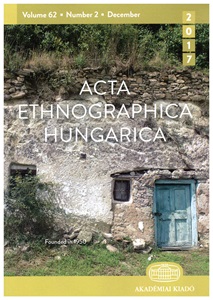“There Are No Recipes” - An Anthropological Assessment of Nutrition in Hungarian Ecovillages
“There Are No Recipes” - An Anthropological Assessment of Nutrition in Hungarian Ecovillages
Author(s): Judit FarkasSubject(s): Anthropology, Agriculture, Health and medicine and law, Human Ecology, Environmental interactions
Published by: Akadémiai Kiadó
Keywords: nutritional anthropology; food movements; biodiversity; gastrodiversity; ecovillage;
Summary/Abstract: Nutrition, as a fundamental human need as well as a manifestation of a social and cultural function, has always been the focus of ethnographic and anthropological research. Various concepts – sometimes radically different and at odds with each other – have emerged in modern societies to define food that can be considered safe. These include various nutrition related movements. Like all social movements, these movements also act as a signaling system: they emerge as a reaction to a societal problem, and the problems they reflect as well as the attempts to formulate solutions also indicate the social dilemmas of the era. Such is the thematization of ecological crisis in recent times. The ecovillage is a specific type of settlement created in response to an ecological, economic and social crisis. The pursuit of an environmentally friendly way of life and self-sufficiency is also reflected in the food culture of ecovillagers, providing an interpretation of safe food deeply embedded in the ecological discourse. The study presents the considerations that govern the foodways of ecovillagers and how these manifest in practice (from farm to table), analyzing it in a framework of interpretation that places the ecovillages in a broader social context. First, the author briefly presents the ecovillages and the specific community being studied. Next, she sets forth the risk and crisis concept providing the framework of interpretation, and outlines the food movements that respond to it. Finally, she turns to the description and analysis of the specific ethnographic material, the modalities of preparing for an ecological crisis, the relationship and significance of biodiversity and gastrodiversity, and demonstrates the role attributed to the community as an institution in this process.
Journal: Acta Ethnographica Hungarica
- Issue Year: 62/2017
- Issue No: 2
- Page Range: 319-337
- Page Count: 19
- Language: English
- Content File-PDF

